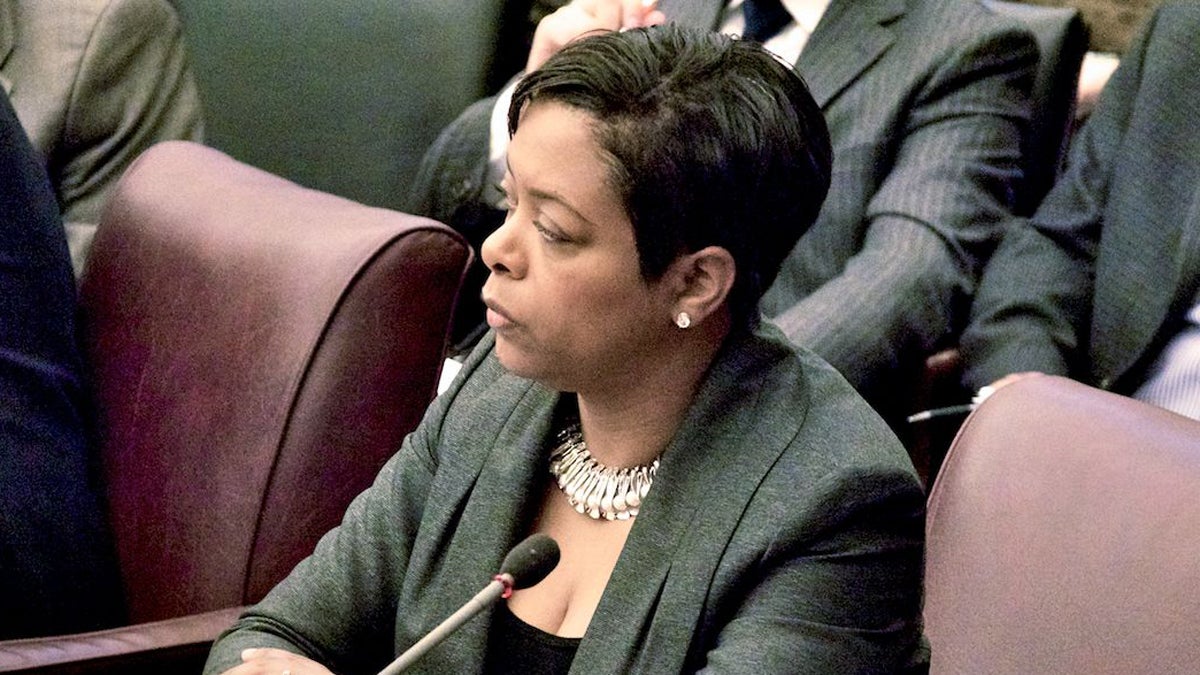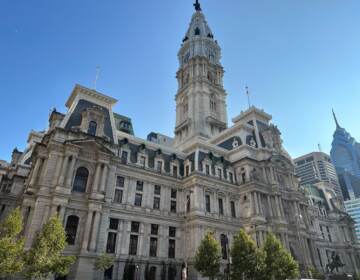Plan targeting bullet-proof barriers at Philly stop and gos fiercely opposed, pushed back
“Our safety is in your hands, our lives are in your hands,” said Adam Xu, chairman of Asian American Licensed Beverage Association.

Philadelphia Councilwoman Cindy Bass outlined concerns about the city's plan for a safe-injection site for drug users. She says it would expose the city to liability officials have not fully considered. (Tom MacDonald/WHYY)
After a fiery hearing, which lasted for much of Monday, the Committee on Public Health and Human Services voted to amend a bill to regulate so-called “stop-and-go” restaurants, which critics say serve take-out alcohol illegally.
Introduced by Cindy Bass, who represents northwestern neighborhoods including much of Germantown and Mt. Airy, the bill is meant to reframe and clarify the city’s restaurant licensing requirements. It would bring local regulations into line with a state law, including new legislation recently signed by Governor Tom Wolf.
But an array of merchant groups, including the Asian American Licensed Beverage Association and the Asian American Chamber of Commerce, argued against a clause that would require “large establishments” with 30 or more seats to remove physical barriers between customers and business owners. They claimed to support the larger bill, but denounced the provision that they see as targeted against late-night businesses that erect bullet-proof glass to protect their employees.
“Our safety is in your hands, our lives are in your hands,” said Adam Xu, chairman of Asian American Licensed Beverage Association. “We will be forced to use guns much more to defend themselves, there will be a lot more gunfighting.”
Opponents of this provision, the vast majority of them Asian-American, packed City Council’s chambers waving signs bearing messages like “Stop The Nonsense, You Are Only Making Criminals Happy,” “Bullet Proof For Everyone,” and “I lost my dignity having voted for Cindy Bass.” The most common sign showed blood-spattered bullet holes and simply read “Rights = Protection.”
The bill’s intent, as the License and Inspections Commissioner Dave Perri explained, is simply to clarify the licenses Philadelphia offers to those who would prepare and serve food. Currently, the city distinguishes between businesses that have 50 or more seats and those that have 49 or fewer.
The new bill would change the two categories to “Large Establishments,” which have the capacity to serve 30 or more seated customer, must have a bathroom open for public use, and no physical barrier separating staff and customers. The latter provision is what stirred up resentment among the small business owners who turned out to protest at Monday’s hearing.
“This bill may intend to achieve good community goals, however, it engenders racial tension and runs counter to our city’s embrace of immigrants and small business owners,” wrote John Chin, executive director of the Philadelphia Chinatown Development Corporation, in testimony written in support of the bill’s opponents.
Small establishments would be defined as those with seating for 30 or fewer customers, which would technically ban them from selling alcohol. A liquor license from the state has always required seating for 30 or more people, although enforcement has been utterly lacking. No barrier or restroom requirements exist for small establishments.
The neighborhood leaders who testified in favor of the bill, the vast majority of whom were African-American, see the bullet-proof glass associated with “stop-and-go” shops to be ugly and disrespectful. They also noted that the “stop-and-go restaurants” are often already flouting the law, in that many do not have the 30 or more seats required by state law.
“To me, the Plexiglas is a modern symbol of discrimination against a people,” said Diane Monroe, chair of the 14th Ward RCO. “The Plexiglas demonstrates to their captive customers that the stop-and-go owners do not value the customers’ safety on the other side of the Plexiglas. They only value the money which is exchanged for a purchase.”
Numerous community representatives spoke against conditions of “stop-and-go” establishments in their neighborhoods, describing a lack of seating, public urination, problem drinking, and food options that don’t range beyond ramen noodles and potato chips.
“Don’t try to pay us for fools,” said Thera Martin, a business corridor manager with the Allegheny West Foundation. She said that of the 115 open businesses on North 22nd Street, only eight have Plexiglas separated owners from customers.
“[Bullet proof glass] sends the message that ‘we are here to get your money and that’s it,’” said Martin.
The crowd that gathered for the hearing was passionate, roaring approval whenever a speaker testified against the bill. The supporters made up for their smaller numbers with emotional testimony that rippled with anger and disappointment at what they describe as nuisance businesses marring their neighborhoods.
After his prepared remarks, Commissioner Perri said that restaurants are intended as community gathering spaces and that the bare minimum standard is that people should be able to sit down and share a meal. The “stop-and-go” shops that Bass is trying to legislate against don’t meet that standard and are often in violation of state law. But his attempt to explain the regulatory nuances of the bill did not cool temperatures in the crowded council chambers.
The hearing began around 10:15 and, allowing time for a couple recesses, the final vote took place at 4:30.
After the extreme acrimony that surrounded the bill, the committee voted to amend to push the date of implantation of the barrier clause backward.
Originally the barriers would have had to be removed by May 1, 2018. Under the amended bill, by January 1, 2021, the Department of Licenses and Inspection will have to issue rules “to provide for the use or removal” of the barriers. That puts the onus of actually determining how the barriers will be regulated by the city’s bureaucracy, as opposed to City Council.
WHYY is your source for fact-based, in-depth journalism and information. As a nonprofit organization, we rely on financial support from readers like you. Please give today.







